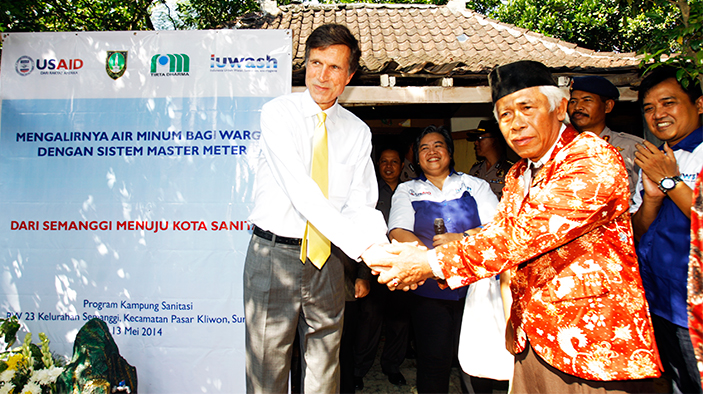Low-Income Households in Indonesia Get Improved Water Supply and Sanitation Facilities
May 19, 2014
U.S. Ambassador Robert O. Blake Jr. accompanied by the Mayor of Surakarta, Indonesia, recently inaugurated new water supply and sanitation facilities in the neighborhood of Semanggi.

The facilities were developed under a program—called Kampung Sanitasi—designed to increase the access of low-income households to safe water supply and sanitation services. The program was implemented by the U.S. Agency for International Development (USAID)-funded Indonesia Urban Water, Sanitation and Hygiene (IUWASH) project, part of the broader U.S.-Indonesia Comprehensive Partnership, an agreement made by Presidents Obama and Yudhoyono to elevate and deepen ties between the two nations. IUWASH supports the Indonesian Government in efforts to increase access to safe water supply and improve sanitation facilities.
The inauguration was conducted in a neighborhood of about 1,800 where, not unlike other urban areas in Indonesia, water supply and sanitation services are very limited. Prior to Kampung Sanitasi, most households did not have piped water, only 10 percent had toilets, and the majority relied on one public water tap and toilet facility. As a result, many households had minimal water to meet daily needs and often practiced open defecation. The overall area had very high rates of water- and sanitation-borne disease.
In recognition of these problems, city officials prioritized improving conditions in that area, and IUWASH then developed the Kampung Sanitasi initiative, which was implemented by a local nongovernmental organization, Lembaga Pengembangan Teknologi Pedesaan. The initiative worked to improve access to water supply and sanitation through innovative approaches such as a Master Meter system for water supply and communal septage management facilities for sanitation. It also raised awareness about practices related to hygiene and put into place strong management systems to ensure sustainability of the new facilities. This program has benefited 350 households (or 1,750 people) about 100 of whom now have access to piped water, another 100 who have benefitted from improved sanitation, and many more who have participated in hygiene awareness training.
“Kampung Sanitasi is a model for providing improved services in water supply and sanitation at the community level,” said Blake. “This program has been especially remarkable for the support by all stakeholders in the city, and we hope it serves Surakarta and other cities well as they undertake similar improvement in other areas.”
For his part, the Mayor of Surakarta, FX Hadi Rudyatmo, was also appreciative. “Before Kampung Semanggi, this community had very unhealthy conditions, but due to everyone’s efforts, we can see how the situation has greatly improved. We thank USAID/IUWASH for its support in this program, as well as many others. The city and USAID/IUWASH continue to implement other programs such as optimizing the wastewater treatment plant, developing regular desludging system, and assisting in improving the performance of the PDAM. Through these and other efforts, we look forward to Surakarta becoming the first “Sanitation City” in Indonesia.”
RELATED CONTENT:
DAI Global Health Event Showcases the USAID P&R Legacy: Governments Better Equipped to Control Infectious Disease
The U.S. Agency for International Development (USAID) launched its Preparedness and Response P&R project five years ago to help select countries tackle deadly infectious diseases. In part because six in 10 infectious diseases in humans are spread from animals, P&R brought together country leaders in the human, animal, and environmental health sectors. Together, they built national One Health platforms to prepare, detect, and respond to disease outbreaks using a multisectoral approach.
Read More